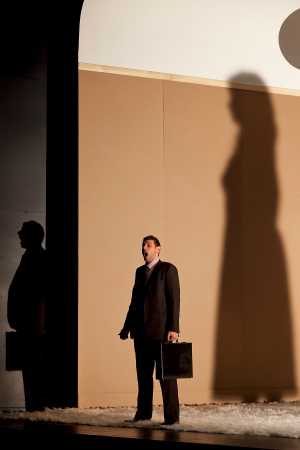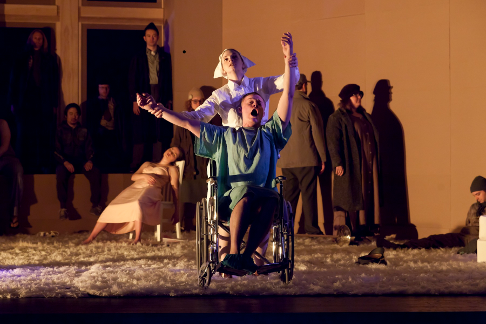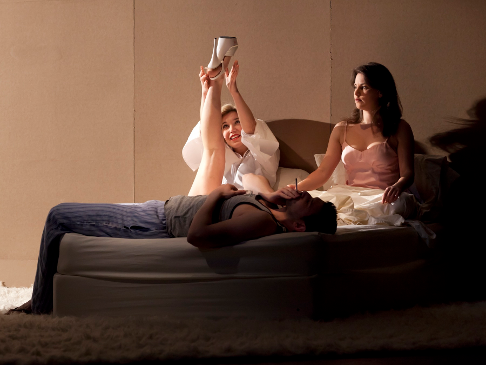It is also unclear how much of
Sogno was ever performed in Mozart’s lifetime—very little,
apparently. The piece’s modern revival, possibly world premiere, took place
in 1979 with a cast (recorded) whose luxe is hardly imaginable for such a
project today: Popp, Gruberova, Mathis, Schreier, et al.
 Michele Angelini as Scipione
Michele Angelini as Scipione
The text is a moralizing serenata by the indefatigable imperial court poet
Metastasio (only his death, after half a century on the job, left the Viennese
post to Lorenzo da Ponte). He drew it from Cicero’s moralizing fable of the
younger Scipio Africanus choosing (in a dream) virtue over pleasure in the fine
old Roman republican manner, thus putting to shame the decadent Romans of
Cicero’s later era when the republic was dying. Metastasio made the choice
between Good Luck (Fortuna) and Self-Discipline (Constanza), and of course
Scipio chooses the latter, though not without Fortuna getting to make her case
pretty well. Sententious sentiment made the libretto ideal for formal
occasions, such as the investment of a new archbishop, but rather a stretch in
the theater. I saw it at the Residenz-Theater in Munich in 1991 (on a
double-bill with Mozart’s Apollo und Hyakinthos); the exquisite
jewel-box theater considerably outshone the music. Neal Goren, of Gotham
Chamber Opera, claims that when he started his company ten years ago, he slyly
told Christopher Alden that there was a Mozart opera that had never been staged
in this country (true) and that it was regarded as unstageable. Alden,
naturally, took this as a challenge. To celebrate ten felicitous years, Gotham
has revived his brilliant opening, which I missed at the time.
 Cast of Il Sogno di Scipione
Cast of Il Sogno di Scipione
The production’s Regie-theater clichés must, in 2001, have been as
startling to a New York audience as Goren hoped they’d be. They still make
the audience laugh—and remain attentive. The curtain rises in heaven, a bare
bedroom, and Scipio wakes scratchily from a doze to find himself literally
between the sheets between two goddesses, from whom he must choose one. (At
last Friday’s performance, Fortuna has gone to bed with filthy feet. I have
no idea whether this was part of the director’s vision.) Fortuna presents
herself as fickle but fun by doing a reverse striptease, pulling assorted
outfits from a closet and trying them on for us. (Shoes! Tops! Wigs!) Constanza
never sheds her nightdress but she invokes the Music of the Spheres,
impersonated by globular hanging lamps. A chorus of dead heroes appears at the
window in assorted deadbeat garb, echoes from a zombie movie. (Scipio,
terrified, climbs on the wardrobe to escape them.) Scipio’s father (Publio,
an amputee in this version) and grandfather (Emilio, wheelchair-bound and
blind) show up to remind the lad of the glories of public service, in arias
that Mozart cannot have intended to possess the ironic air Alden’s staging
gives them. At last, though spooked, Scipio chooses Constanza (the path of
duty), Fortuna is frustrated, and an Epilogue (Licenza) appears to warble the
best tune of the night, congratulating the audience (in Mozart’s day, the
Archibishop; nowadays, us) for having the taste to admire this sublime
entertainment. Alden’s Licenza demonstrates her enthusiasm by tossing disco
moves into her coloratura ecstasies.
All of this activity and ironic subtext-as-commentary-within-action
undoubtedly gives the score a better chance of being appreciated than it would
ever secure if performed “straight.” Doubt crept in during the more
elaborate vocal displays—the piece was written for vocal display,
illustrating and underlining the meanings of the text, and as the intended
first cast were Salzburg singers, Mozart knew just what they could do. The
young singers performing for Gotham Chamber Opera were all of them more than
qualified to do justice to Mozart, personable, talented actors as well. But
none of the performances was entirely on the mark, coloratura were often
uneven, a little tuneless or imprecise, and it was impossible to suppress the
notion that they’d have sung better if there had been less wriggling about
(or tottering, in the case of amputated Publio, or clambering up the walls of
the armoire in the case of Scipio, or thrash-dancing in the case of Licenza).
It was an occasion of colorful performing but the Mozart-singing suffered for
it.
 Susannah Biller as Fortuna, Michele Angelini as Scipione and Marie-Ève Munger as Constanza
Susannah Biller as Fortuna, Michele Angelini as Scipione and Marie-Ève Munger as Constanza
The two most interesting voices, the ones that made me eager to hear them
again in less athletic circumstances, belonged to Michele Angelini as dreaming
Scipio and to Maeve Höglund as Licenza. Angelini possesses a baritonal tenor,
an agreeable sound of masculine depth and a happy instinct for phrasing, plus
an easy extension to an agreeable lyric top. One foresees enjoying him as
Idomeneo or Belmonte. Höglund had the most sensuous voice of the bunch, a
soprano with mezzo undertones, luscious and sensuous in a text that lacked
seductive implications but seemed to have them when she put it over. Susannah
Biller’s Fortuna was flashy, sometimes to strident effect. Marie-Ève
Munger’s Costanza was altogether more cozy, but then it can’t be easy to
impersonate something so stolid with any flare. Arthur Espiritu and Chad A.
Johnson were effective as the ghosts of Scipio’s family past. Neal Goren led
a very spirited orchestra and chorus, and nearly two hours passed as
harmoniously as Ptolemy the Astronomer could have demanded.
John Yohalem
![Susannah Biller as Fortuna [Photo by Richard Termine courtesy of Gotham Chamber Opera]](http://www.operatoday.com/RT_MG_0365_1.png)


